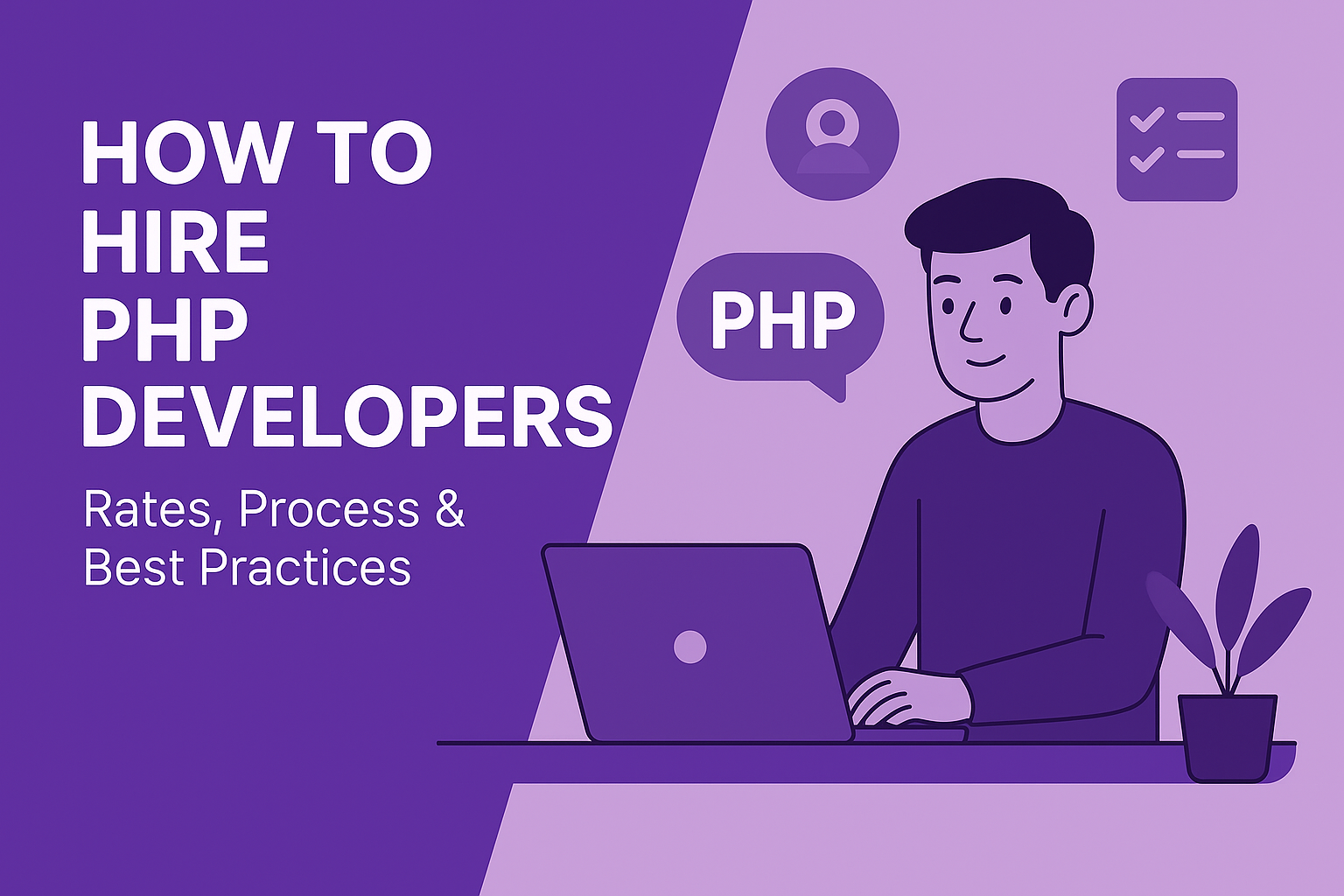How Much Does It Cost to Hire PHP Developers?
PHP developer costs vary significantly based on location, experience level, and engagement model. Understanding these cost structures helps you budget effectively and choose the right hiring approach.
Regional Hourly Rate Breakdown:
Eastern Europe (Bulgaria, Poland, Romania): $25-49/hr
Western Europe (UK, Germany, Netherlands): $50-80/hr
North America (US, Canada): $70-120/hr
Asia (India, Philippines): $15-30/hr
Dedicated vs Freelance Cost Comparison:
Dedicated PHP developers work exclusively on your projects through established service providers. You typically pay $25-49/hr in Eastern Europe with guaranteed availability, backup coverage, and project management support. This model includes quality assurance and reduces management overhead.
Freelance PHP developers offer more flexibility with potentially lower hourly rates ($20-40/hr globally). However, you handle all project management, bear availability risks, and manage quality control yourself. Freelancers work well for small, well-defined tasks but become challenging for complex, long-term projects.
Offshore PHP Developer Rates:
Offshore development in regions like Eastern Europe provides the best balance of cost, quality, and collaboration. Unlike far-offshore options in Asia with 8-12 hour time differences, Eastern European developers offer 2-4 hour time zone overlap with Western Europe and reasonable overlap with US East Coast.
Project-Based Pricing Examples:
WordPress customization: $2,000-8,000
Custom PHP web application: $10,000-40,000
Laravel-based SaaS platform: $30,000-100,000+
Legacy PHP modernization: $15,000-60,000
These ranges depend on complexity, required integrations, user scale, and security requirements. Projects requiring real-time features, complex data processing, or extensive third-party integrations fall at the higher end.
Where Can You Hire PHP Developers?
You have several options for sourcing PHP development talent, each suited to different project types and organizational needs.
Dedicated PHP Development Teams:
Dedicated teams provide multiple developers working exclusively on your projects. You get a complete unit including senior and mid-level PHP developers, often with integrated QA testing support. This model suits long-term projects requiring sustained development effort.
Service providers handle recruitment, team building, and administrative tasks while you maintain control over daily priorities and technical decisions. Team setup typically requires 2-3 weeks including knowledge transfer and environment configuration.
Staff Augmentation Services:
Staff augmentation extends your existing team with external PHP developers who integrate as team members. You maintain direct control over their daily work while the provider handles HR, payroll, and replacement if needed.
This approach works best when you have existing technical leadership and need additional development capacity. Developers can start within 1-2 weeks, making staff augmentation the fastest path to adding PHP expertise.
Freelance PHP Developers:
Freelance platforms like Upwork, Toptal, and Freelancer connect you with individual PHP developers. This provides maximum flexibility and potentially lower costs for small projects or specific tasks.
However, freelancers require significant management effort. You handle screening, contracting, payment processing, and quality assurance yourself. Freelancer availability fluctuates, creating risks for projects with firm deadlines. Consider freelancers for well-scoped tasks under 40 hours rather than ongoing development work.
Offshore PHP Developer Options:
Offshore development partners in Eastern Europe offer compelling advantages. Time zone overlap enables real-time collaboration during your business hours. Cultural alignment and strong English proficiency facilitate clear communication. Most importantly, you access deep talent pools with strong technical education at competitive rates.
Eastern European countries produce thousands of PHP developers annually, creating mature ecosystems with specialists in Laravel, Symfony, WordPress, and custom PHP development.
How Do You Hire a PHP Developer? [5-Step Process]
Step 1: Define PHP Project Requirements
Start by documenting your technical needs. Which PHP frameworks does your project use or require? Laravel for modern applications, Symfony for enterprise systems, WordPress for content management, or custom PHP for legacy applications?
Specify database requirements (MySQL, PostgreSQL, MongoDB), required integrations (payment gateways, CRMs, APIs), performance expectations, and security standards. Clear requirements enable accurate candidate evaluation and prevent misalignment.
Step 2: Choose Your Engagement Model
Select between dedicated teams, staff augmentation, or freelancers based on project scope and timeline:
Dedicated teams for long-term projects (6+ months) requiring multiple developersStaff augmentation for extending existing teams with specific expertiseFreelancers for small, well-defined tasks or short-term needs
Consider offshore options when budget constraints exist but quality cannot be compromised. Eastern European PHP developers provide the optimal balance.
Step 3: Vet Technical Skills
Technical evaluation separates developers who claim PHP expertise from those who deliver quality code. Use practical assessments:
Framework Knowledge:Test Laravel developers on Eloquent ORM, middleware, and queue management. Symfony developers should demonstrate dependency injection and event dispatcher understanding. WordPress developers need theme development and plugin architecture knowledge.
Code Quality Assessment:Review code samples or GitHub repositories. Look for clean, maintainable code following PSR standards, proper error handling, security consciousness, and appropriate use of design patterns.
Database Proficiency:Assess SQL query optimization, indexing strategies, and ORM usage. PHP developers must understand database performance implications.
Live Coding Sessions:Conduct practical exercises mirroring real project challenges. Focus on problem-solving approach rather than memorized syntax.
Step 4: Assess Experience Level
Match developer experience to project needs:
Junior PHP Developers (0-2 years):Handle well-defined tasks under supervision. Suitable for maintenance work, feature implementations following established patterns, and projects with strong technical leadership. Lower rates but require mentoring.
Mid-Level PHP Developers (3-5 years):Work independently on most development tasks. Build features, implement APIs, optimize database queries, and handle moderate complexity challenges. Represent the sweet spot for most projects.
Senior PHP Developers (6+ years):Architect solutions, make strategic technical decisions, mentor junior developers, and solve complex performance or scaling challenges. Essential for greenfield projects, major refactoring, or technical leadership roles.
Step 5: Onboarding and Integration
Effective onboarding accelerates productivity. Prepare comprehensive documentation including codebase structure, coding standards, development environment setup, database schemas, and deployment processes.
Assign a mentor for the first 2-3 weeks to answer questions and provide context. Schedule regular check-ins during the first month to address concerns early. For offshore developers, establish core overlap hours for real-time collaboration on complex problems.
What Should You Look for When Hiring PHP Developers?
Framework Expertise:
Modern PHP development centers on frameworks. Laravel dominates modern applications with elegant syntax and comprehensive features. Symfony powers enterprise applications requiring flexibility and long-term stability. CodeIgniter suits smaller projects needing simplicity. Evaluate framework experience matching your technology stack.
PHP Version Knowledge:
PHP 7.x brought dramatic performance improvements. PHP 8.x added features like named arguments, attributes, and JIT compilation. Developers should understand version differences and be comfortable with modern PHP features. Projects still running PHP 5.x require developers experienced in legacy system modernization.
Database Skills:
PHP developers need strong database competency. MySQL remains the most common pairing with PHP. PostgreSQL provides advanced features for complex applications. Developers should demonstrate query optimization, proper indexing, transaction management, and security practices preventing SQL injection.
Security Best Practices:
PHP's flexibility creates security vulnerabilities when misused. Skilled developers implement input validation, prepared statements, proper authentication, secure session management, and protection against common vulnerabilities (XSS, CSRF, SQL injection).
Communication Skills:
Remote PHP development demands clear communication. Developers must explain technical concepts, document code, proactively raise concerns, and collaborate effectively across time zones. Strong written English proficiency matters as much as technical skills for distributed teams.
Why Hire Dedicated PHP Developers vs Freelancers?
Dedicated Team Benefits:
Reliability defines dedicated PHP developers. Service providers guarantee availability, provide backup coverage if developers are unavailable, and maintain bench strength for quick scaling. You get consistent team members who build deep knowledge of your systems.
Accountability improves with dedicated teams. Providers take responsibility for code quality, deadline delivery, and professional conduct. Integrated project management and quality assurance reduce your management overhead.
Long-term projects benefit from team continuity. Dedicated developers invest in understanding your business logic, technical architecture, and development practices, becoming increasingly productive over time.
Freelancer Advantages:
Freelance PHP developers offer maximum flexibility. You engage them for specific tasks without long-term commitments. This works well for variable workloads or experimental projects where requirements remain uncertain.
Cost advantages exist for small projects. Freelancer hourly rates may be lower than agency rates, though you must factor in your management time and quality assurance effort.
When to Choose Each Option:
Choose dedicated PHP developers for ongoing development work, complex applications requiring sustained attention, projects with firm quality standards, or situations where you lack in-house technical leadership.
Select freelancers for well-defined tasks under 40 hours, proof-of-concept projects, situations with existing strong technical oversight, or temporary workload spikes with clear boundaries.
Risk Comparison:
Dedicated teams minimize risks through backup coverage, code review processes, quality assurance, and provider accountability. Freelancers shift all risks to you - availability, quality, security, and project continuity.
Frequently Asked Questions
Can I hire PHP developers part-time?
Yes, most service providers offer part-time engagement options. Part-time PHP developers work well for maintenance, support, or projects with variable workloads. Expect slightly higher hourly rates for part-time arrangements as providers factor reduced utilization. Minimum commitments typically range from 20 hours weekly.
How quickly can I hire a dedicated PHP developer?
Through established IT service providers, you can hire dedicated PHP developers within 1-2 weeks. Providers maintain pre-vetted talent pools and handle administrative setup. Direct hiring through traditional recruitment takes 4-8 weeks including posting, screening, interviews, and notice periods.
Do offshore PHP developers speak English?
Eastern European PHP developers typically have strong English proficiency, particularly in countries like Bulgaria, Poland, and Romania where English education starts early. Most developers hold B2-C1 English levels, enabling clear technical communication. Review English proficiency during interviews for distributed teams.
What's included in PHP developer rates?
Hourly rates through service providers typically include developer salary, project management support, quality assurance oversight, infrastructure and tools, administrative overhead, and backup coverage. Freelance rates cover only developer time—you handle everything else yourself.





